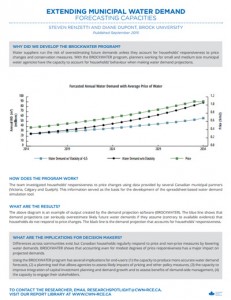Extending Municipal Water Demand Forecasting Capacities by Incorporating Behavioural Responses
Principal Investigator - Steven Renzetti, Professor, Brock University, 2013 - 2014

Challenge
Growing urban water demands are putting increasing pressure on the infrastructure of many water agencies, signaling the potential need for greater capital investments. Most water agencies forecast demand by multiplying future population estimates with historical per capita water use. However, this approach tends to be inaccurate by failing to account for other demand drivers, such as income, price and household appliance holdings. Providing water agencies with enhanced water forecasting capabilities that better reflect water users’ behaviour is one way these agencies can address this challenge.
The proposed study builds upon the following initial project:
Project (2008-2012): More Value from the Same Water: Maximizing Water’s Sustainable Contribution to the Canadian Economy, Diane Dupont, Brock University
This project sought to advance understanding of the factors (i) governing water use, (ii) influencing water recirculation decisions, and (iii) influencing adoption of residential water conserving technologies. The project produced statistical models of households’ and manufacturing firms’ water use.
As an extension of this research, the proposed project is based on observations made by a number of experts in the municipal water sector. Specfically, it has been observed that water conservation departments are not always involved in demand forecasting, since this is done on the basis of infrastructure requirements. Previous experience in the energy industry has demonstrated how costly it can be to overbuild supply networks based on faulty demand forecasts that have failed to incorporate behavioural responses related to conservation. Thus, there is a need to bring together the behavioural sciences that underlie efforts to promote water conservation in the short-term with longer-term water demand forecasts.
Project
The project methodology and work plan were developed in collaboration with research partners. Academic research components will be informed by relevant research literature and will reflect state of the art methods, while project outputs will be designed using clear, non-technical language to maximize user understanding and uptake.
The proposed project has been organized into two stages.
Stage 1:
Working with the city of Guelph, the city of Calgary and British Columbia’s Capital Region District (CRD), necessary water use and household characteristics data will be collected. Next, literature reviews will be conducted on residential demand elasticity and water demand forecasting methods and cases. Using this information, the researchers will produce an estimation of residential water demand models, which will facilitate the development of water demand forecasting models. Partner feedback will be applied to refine forecasting models and to revise user manuals.
Stage 2:
A water demand forecasting workshop will be held in partnership with the CWWA. As well, the final version of the water demand forecasting spreadsheet and supporting documentation will be released at this time.
Outputs
Anticipated outputs include:
- Construction of a demand forecasting computer model and user manual
- Facilitation of a water demand forecasting workshop
- Real-world case studies of cities who have adopted the demand forecasting model
Outcomes
Anticipated Outcomes Include:
With the estimation of residential water demand models, the calculation of price and other elasticities and the construction of a demand forecasting model, the outputs of stage 1 are expected to produce the following outcomes:
- Greater capacity for Guelph, Calgary and the CRD to undertake enhanced water demand forecasting
- Increased awareness of the potential for improved demand forecasting through peer-reviewed publications and conference presentations
By holding a water demand forecasting workshop, the project is expected to produce the following outcomes
- Contributing to the achievement of the CWWA National Water and Energy Efficiency Committee’s listed purpose and functions
- Improved understanding of water demand forecasting demonstrated by workshop attendees





